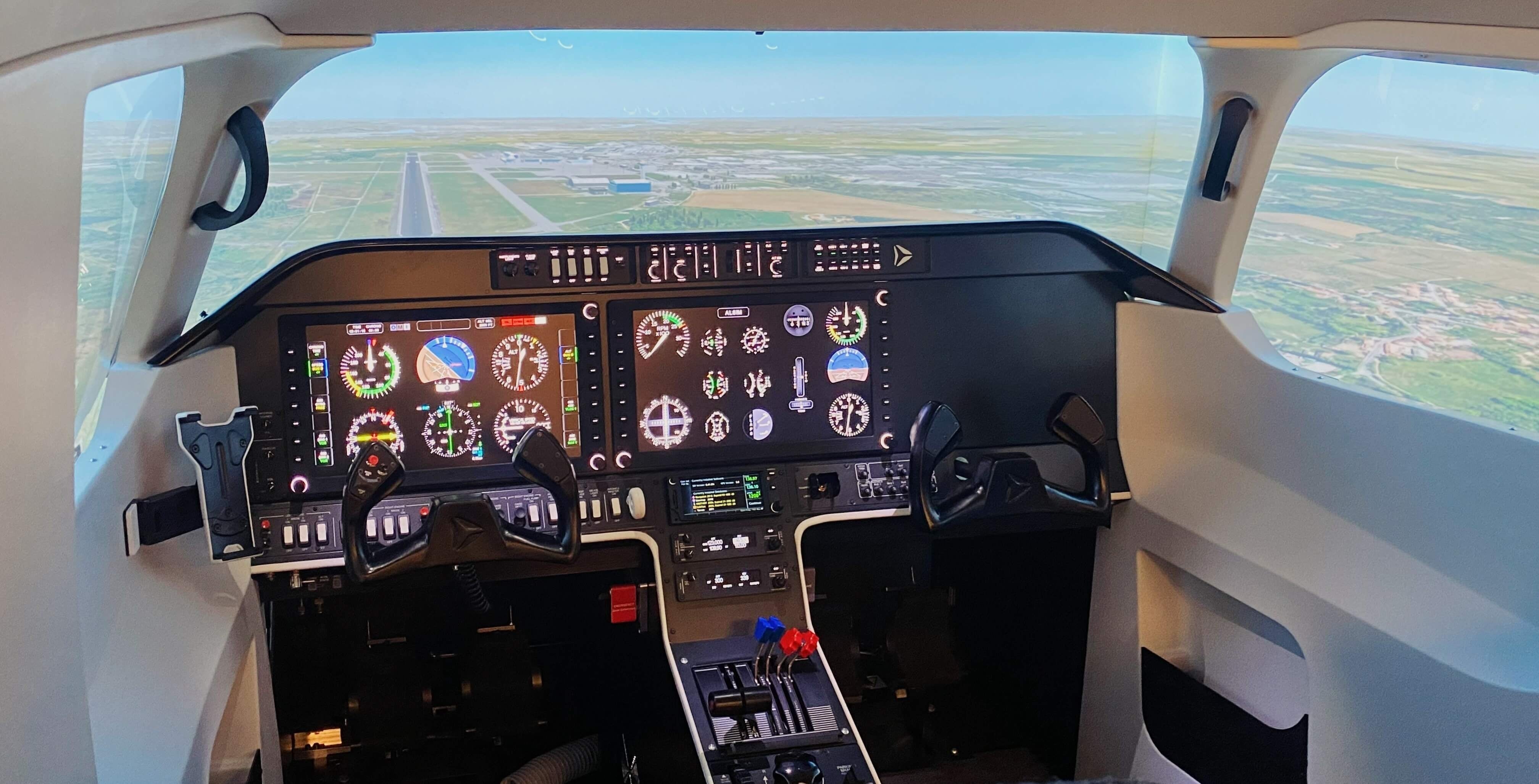
Aviation research takes off virtually on campus
New flight simulator will prioritize research questions from across campus

New flight simulator will prioritize research questions from across campus
By Elizabeth Kleisath Faculty of ScienceThe University of Waterloo has recently undertaken a significant step forward in promoting aviation research on campus, through the purchase of a new flight simulator.
The new flight simulator will allow researchers to have priority access to a simulator, which although common technology within flight school settings — including the Waterloo Wellington Flight Centre — they usually prioritize student flight training instead of research efforts.
In support of the Aviation program at Waterloo, and the newly-announced Waterloo Institute for Sustainable Aeronautics, this Alsim AL250 flight simulator will open the skies virtually to researchers looking to expand their research into the aviation industry.
“We’re bringing together a variety of leading experts who have already solved a problem in another discipline, in order to help aviation,” says Suzanne Kearns, Professor of Aviation. “We really want it to be accessible to researchers, mobilizing them to think about how they could use the simulator in new and innovative ways based on their own expertise.”

To rent out a flight simulator under normal circumstances would set a researcher back $125/hour plus an additional $75/hour for an instructor or technician’s time. Waterloo’s simulator aims to remove this barrier by only charging researchers for the technician’s support, therefore attracting more cross-disciplinary research to the aviation field.
Much of the research in the simulator will focus on human performance while flying an aircraft. It will also study the intersection of three main sustainability topics within the aviation industry: environmental, economic and social sustainability.
Not only does a flight simulator save on fuel emissions and fuel costs compared to using an airplane, it contributes to training and development advances, and also establishes more fulfilling ways of workforce development to create a sustainable work environment. The aviation industry relies on regulations surrounding pilot training to ensure the safety of everyone, and research into aviation is often done with the goal of improving these regulations.
“We want to do a better job training people and understanding how to teach them to be more efficient and avoid errors and accidents,” says Kearns. “If you can show the regulators that you are effectively able to develop skills in a simulator, then you can justify to regulators to move more of those hours out of airplanes, which decreases emissions and is also more affordable for students.”
Current project plans in the simulator include researchers from many interdisciplinary corners of our campus community. Professor Kearns’ research focuses on competency training for aviation, and assessing the skills of pilots during training. Dr. Elizabeth Irving, a Professor in the School of Optometry is lending her expertise to study evidence-based visual standards for pilots to measure what level of visual acuity is required for pilot’s medical fitness. Professor Shi Cao from the Faculty of Engineering is interested in using machine learning to recognize and assess a pilot’s performance in the simulator and identify objective metrics for assessing areas of strengths and areas where improvements could be made during a student’s training. Professor Ewa Niechwiej-Szwedo from the Faculty of Health is interested in gaze behaviour, and studying if the way people move their eyes around the control panel in front of them can indicate competency levels.
“Ultimately, we want to be promoting aviation outreach to the general community,” says Kearns. When time permits between research, the plan is to also offer short half hour demonstration flights and tours to the campus community. “I think it could lead to ripple effects for people thinking about their own academics or new research questions.”
 Bob Lemieux, Dean of Science in the flight simulator
Bob Lemieux, Dean of Science in the flight simulator
The flight simulator was funded through collaborative grant contributions from the Faculty of Science, the Faculty of Environment, and funding from Waterloo’s Provost. It is now installed in EV1 and will be looking into ways to share the experience of flight with our campus community.

Read more
Interdisciplinary research members of Waterloo’s new Institute for Sustainable Aeronautics will examine pilot error to strengthen training practices

Read more
In an industry with soaring growth, keeping air travel sustainable means training future aviators to transform the industry

Read more
Jazz Aviation offers new program that gives qualified aviation students a more direct pathway to a major airline
The University of Waterloo acknowledges that much of our work takes place on the traditional territory of the Neutral, Anishinaabeg, and Haudenosaunee peoples. Our main campus is situated on the Haldimand Tract, the land granted to the Six Nations that includes six miles on each side of the Grand River. Our active work toward reconciliation takes place across our campuses through research, learning, teaching, and community building, and is co-ordinated within the Office of Indigenous Relations.